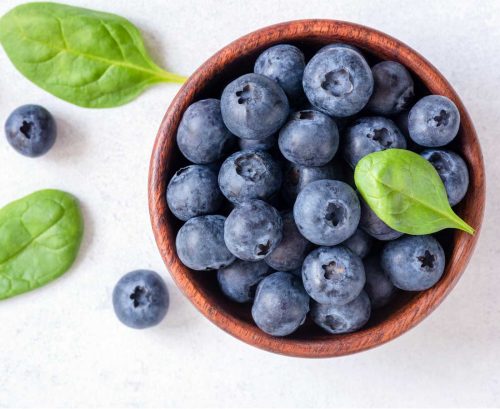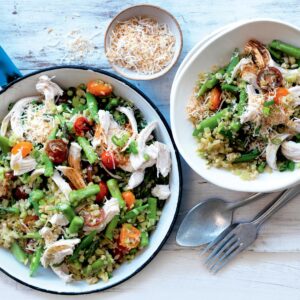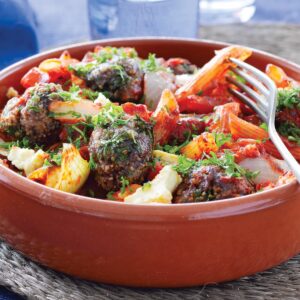
Wondering how to stay well and sneeze-free this year? A great place to start is by packing your dinner plate full of immunity-boosting foods. Health writer Karen Fittall shows you what to eat to support your immune system.
This year’s cold and flu season is playing out differently to years gone by thanks to one thing: coronavirus. The coronavirus pandemic — COVID-19 — is more contagious and more deadly than the seasonal flu. Plus, experts believe experiencing the ‘dreaded duo’ of respiratory diseases — catching influenza and coronavirus at the same time — is a real possibility for some people, particularly when flu seasons hit their peak around the world.
While we don’t know enough about coronavirus just yet, we do know a lot about the common cold and the flu, including that it’s possible to be exposed to the viruses that cause them and remain healthy — or symptom free. One explanation is if you’ve been exposed to a specific virus before, your body might have developed antibodies to make you immune to it.
But how strong your immune system is — or isn’t — also plays a key role, so it pays to do (and eat) what you can to keep your immunity in tip-top shape.
What to eat to boost your immunity
While no single food is a magic immunity bullet, these seven foods will certainly give your immune system a shot in the arm against cold and flu-causing viruses.
Blueberries
Why? They’re a rich source of flavonoids (plant chemicals that are powerful antioxidants), delivering anti-inflammatory and immune-system benefits. A University of Auckland study also shows a regular dose of flavonoids reduces your risk of catching a cold by 33 per cent.
How much? The researchers say eating 100g of blueberries a day is enough to yield a ‘therapeutic dose’ of the key ingredient. Freezing blueberries actually makes their flavonoids more available for absorption, so the frozen variety is a great alternative to the fresh.
Canned red salmon
Why? It’s one of the few foods with a good hit of vitamin D, a vitamin increasingly recognised for specifically helping to protect against upper respiratory tract infections like colds and flu. So, while it’s difficult to get enough vitamin D from food alone, and UV exposure remains the best source for most of us, regularly eating a serving of tinned red salmon — rather than pink — is a great vitamin D idea.
How much? Add some canned red salmon to salads, sandwiches and toasties at least 2–3 times a week.
Wheat germ oil
Why? It is one of the best sources of vitamin E, which can lower your risk of developing a cold by about 20 per cent if you consume enough of it each day. How? It boosts the function of the immune system’s defender cells, which then multiply to fight infection when viruses
are present.
How much? Try to consume two tablespoons of cold wheat germ oil a day in salad dressings, or drizzled over grains or vegetables. Sunflower seeds, almonds and hazelnuts are also good sources of vitamin E.
Shiitake mushrooms
Why? Shiitakes contain the soluble fibre, beta-glucan, that stimulates the immune system. Researchers say dried shiitakes work just as well as fresh ones for boosting your immunity.
How much? Consume 10g of these each day and after four weeks your immune system’s cells will function more effectively. Great in risotto or ramen noodle soup!
Brazil nuts
Why? Eating a few of these nuts a day will provide enough selenium to help fortify your immune system and stimulate the production of white blood cells to fight infection. Plus, a selenium deficiency can also contribute to more severe flu symptoms if you do get sick, so keep your levels topped up.
How much? Aim to snack on four or five Brazil nuts during the day.
Legumes
Why? Legumes are a very good source of prebiotic fibre, which then passes through the gastrointestinal tract undigested to stimulate the growth or the activity of ‘good’ bacteria in the large intestine. This is important because research proves there’s a clear link between gut health and immunity. In fact, one study published last year found that when the gut microbiome gets disrupted, it can even make the flu vaccine less effective. Plus, legumes contain resistant starch, a fibre-like substance that helps to encourage the production of butyrate, a short-chain fatty acid that on its own helps to regulate the immune system.
How much? Enjoy 100g (½ cup of legumes) at least 2–3 times each week. Mix it up — go for canned beans, chickpeas or dried lentils.
Spinach
Why? Spinach contains lutein, a vitamin that can dampen down inflammation in immune cells. Suppressing that inflammation is vital to help protect against colds and flu. So, what’s so bad about inflammation? Well, the symptoms you experience when you get a cold aren’t caused by the virus itself: they’re actually a side effect of the inflammatory response that your body initiates when it encounters a virus. So, the larger or the stronger your immune system’s inflammatory response, the more likely you are to experience symptoms if you’re exposed to a cold or to a flu-causing virus.
How much? Studies suggest the best way for our bodies to absorb lutein from spinach is in the form of a smoothie or juice, so maybe add a large handful to your next brekkie smoothie!
Foods that fight your immune system
Alcohol
Consuming too much of it decreases the frequency of lymphocytes, the white blood cells that are one of the body’s main types of immune cells. And that can increase the risk of viral infections. So if you do drink alcohol, have no more than 10 standard drinks per week, and no more than four standard drinks during any one day.
Salt
Australian research now shows eating too much salt pushes the immune system out of equilibrium. And — most of us do eat too much salt — about 9g when we should be eating less than 5g a day. About three-quarters of our salt comes from processed foods, so swap these for fresh food options, and pick packaged products with less than 120mg of sodium per 100g serve.
Sugar
A 2018 study showed that high-sugar diets can help trigger the immune system inflammation that makes developing symptoms in the presence of a virus more likely. And unfortunately, about one in two Australians are consuming more added sugar than the guidelines say is healthy. To cut back, avoid sugary drinks, choose wholegrain over highly processed carbohydrates, and when you notice a food’s sugar content is more than 15g per 100g, check that ‘sugar’ (or alternative names for sugar like dextrose, fructose and glucose), isn’t listed high up on the ingredients list.
5 ways to stay well
Eating healthily is not the only thing you can do to help your immune system stay strong:
Prioritise sleep and exercise
A good night’s sleep and exercising regularly will both support your immune system. You will almost halve your risk of catching a cold if you stay active. And, compared to having less than six hours sleep, if you get at least seven you’ll be four times less likely to get sick if you’re exposed to a cold virus.
Know your symptoms
Cold and flu are caused by completely different viruses: flu symptoms are usually much more severe, longer lasting and can even lead to life-threatening complications. While a cold and the flu share some of the same symptoms (like a cough, sore throat and fatigue), common cold symptoms like a runny nose and sneezing are rare with the flu. Common flu symptoms such as fever, headache and aches and pains are rare with a cold. See your doctor if a cough and a fever above 38°C doesn’t improve.
Stay calm
Keeping calm is not always easy, but research shows you’re more susceptible to developing a cold when you’re stressed, due to the way stress affects your immune system. Relaxation techniques like meditation and mindfulness can help lower stress levels — and so can doing something active!
Wash your hands
This is one of your best lines of defence. Viruses can survive on surfaces for up to two days, so one main way people get sick is by touching something that’s been contaminated and then touching their face (something we do about 23 times an hour without realising it.) Wash your hands regularly and thoroughly for at least 20 seconds, then dry them properly. If you’re using a hand sanitiser, choose one that contains more than 60 per cent alcohol. Use it liberally, and rub it in for at least 20 seconds; then wait for it to dry completely before you touch anything.
Get the flu jab
Vaccination is the best way to reduce your risk of getting the flu. Experts recommend that we get vaccinated before flu season starts, because the flu shot provides its best protection in the three or four months after being vaccinated.
Article sources and references
- Australian Bureau of Statistics. 2016. Australian Health Survey: Consumption of added sugars, 2011–12.https://www.abs.gov.au/ausstats/[email protected]/Lookup/by%20Subject/4364.0.55.011~2011-12~Main%20Features~Consumption%20of%20Added%20Sugars%20-%20A%20comparison%20of%201995%20to%202011-12~20
- Akramiene et al. 2007. Effects of beta-glucans on the immune system. Medicina (Kaunas). 43(8): 597–606. Australian Psychological Society. 2020. Stress.https://pubmed.ncbi.nlm.nih.gov/17895634/
- Australian Psychological Society. 2020. Stress.https://www.psychology.org.au/for-the-public/Psychology-Topics/Stress
- Australian Government Department of Health. 2020. Clinical update: 2020 seasonal influenza vaccines — early advice for vaccination providers.https://www.health.gov.au/news/clinical-update-2020-seasonal-influenza-vaccines-early-advice-for-vaccination-providers
- Baker Heart and Diabetes Institute. 2015. Too much salt in food can push the immune system out of equilibrium.https://baker.edu.au/news/in-the-media/Too-much-Salt-in-Food-can-push-the-Immune-System-out-of-Equilibrium
- Barr et al. 2016. Opposing effects of alcohol on the immune system. Prog Neuropsychopharmacol Biol Psychiatry. 65: 242–51.https://pubmed.ncbi.nlm.nih.gov/26375241/
www.healthyfood.com










